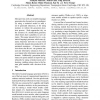Free Online Productivity Tools
i2Speak
i2Symbol
i2OCR
iTex2Img
iWeb2Print
iWeb2Shot
i2Type
iPdf2Split
iPdf2Merge
i2Bopomofo
i2Arabic
i2Style
i2Image
i2PDF
iLatex2Rtf
Sci2ools
116
click to vote
ACL
2010
2010
Phrase-Based Statistical Language Generation Using Graphical Models and Active Learning
Most previous work on trainable language generation has focused on two paradigms: (a) using a statistical model to rank a set of generated utterances, or (b) using statistics to inform the generation decision process. Both approaches rely on the existence of a handcrafted generator, which limits their scalability to new domains. This paper presents BAGEL, a statistical language generator which uses dynamic Bayesian networks to learn from semantically-aligned data produced by 42 untrained annotators. A human evaluation shows that BAGEL can generate natural and informative utterances from unseen inputs in the information presentation domain. Additionally, generation performance on sparse datasets is improved significantly by using certainty-based active learning, yielding ratings close to the human gold standard with a fraction of the data.
ACL 2010 | Computational Linguistics | Dynamic Bayesian Networks | Generation Decision Process | Trainable Language Generation |
Related Content
| Added | 10 Feb 2011 |
| Updated | 10 Feb 2011 |
| Type | Journal |
| Year | 2010 |
| Where | ACL |
| Authors | François Mairesse, Milica Gasic, Filip Jurcícek, Simon Keizer, Blaise Thomson, Kai Yu, Steve Young |
Comments (0)

